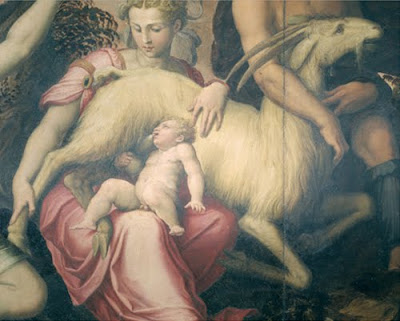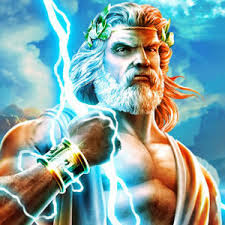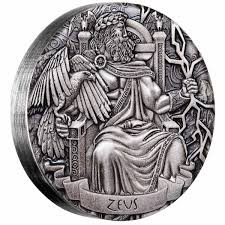ZEUS was tended by gentle nymphs and was nursed by the fairy goat Amaltheia. From the horns of the goat flowed ambrosia and nectar, the food and drink of the gods. Zeus grew rapidly, and it was not long before he strode out of the cave as a great new god. To thank the nymphs for tending him so well, he gave them the horns of the goat. They were horns of plenty and could never be emptied. From the hide of the goat he made for himself an impenetrable breastplate, the Aegis, and now he was so strong that Cronus could do nothing against him.
Young Zeus chose Metis, a Titan's daughter, for his first wife. She was the goddess of prudence, and he needed her good advice. She warned him not to try alone to overthrow his child-devouring father, for Cronus had all the other Titans and their sons on his side. First Zeus must also have strong allies.
Metis went to Cronus and cunningly tricked him into eating a magic herb. He thought that the herb would make him unconquerable. Instead it made him so sick that he vomited up not only the stone he had swallowed, but his five other children as well. They were the gods Hades and Poseidon and the goddesses Hestia, Demeter, and Hera, all mighty gods who right away joined forces with Zeus. When Cronus saw the six young gods rising against him, he knew that his hour had come and he surrendered his powers and fled.
Now Zeus was the lord of the universe. He did not want to rule alone. He shared his powers with his brothers and sisters. But the Titans and their sons revolted. They refused to let themselves be ruled by the new gods. Only Prometheus and his brother Epimetheus left the Titans to join Zeus, for Prometheus could look into the future and he knew that Zeus would win.
Zeus freed the monstrous sons of Mother Earth from Tartarus. Gratefully the hundred- armed ones fought for him with all their strength, and the Cyclopes forged mighty weapons for him and his brothers.
They made a trident for Poseidon. It was so forceful that when he struck the ground with it, the earth shook, and when he struck the sea, frothing waves stood mountain high.
For Hades they made a cap of invisibility so he could strike his enemies unseen, and for Zeus they forged lightning bolts. Armed with them, he was the mightiest god of them all, nothing could stand against him and his thunderbolts. The Titans fought a bitter battle, but at last they had to surrender, and Zeus locked them up in Tartarus. The hundred-armed monsters went to stand guard at the gates to see that they never escaped. Atlas, the strongest of the Titans, was sent to the end of the world to carry forever the vault of the sky on his shoulders.
Angry with Zeus for sending her sons the Titans into the dark pit of Tartarus, Mother Earth now brought forth two terrible monsters, Typhon and his mate, Echidna, and sent them against Zeus. They were so fearful that when the gods saw them they changed themselves into animals and fled in terror. Typhon's hundred horrible heads touched the stars, venom dripped from his evil eyes, and lava and red-hot stones poured from his gaping mouths. Hissing like a hundred snakes and roaring like a hundred lions, he tore up whole mountains and threw them at the gods.
Zeus soon regained his courage and turned, and when the other gods saw him taking his stand, they came back to help him fight the monster. A terrible battle raged, and hardly a living creature was left on earth. But Zeus was fated to win, and as Typhon tore up huge Mount Aetna to hurl at the gods, Zeus struck it with a hundred well-aimed thunderbolts and the mountain fell back, pinning Typhon underneath. There the monster lies to this very day, belching fire, lava, and smoke through the top of the mountain.
Echidna, his hideous mate, escaped destruction. She cowered in a cave, protecting Typhon's dreadful offspring, and Zeus let them live as a challenge to future heroes.
Now at last Mother Earth gave up her struggle.
There were no more upheavals, and the wounds of the war soon healed. The mountains stood firmly anchored. The seas had their shores. The rivers had their riverbeds and oxhorned river-gods watched over them, and each tree and each spring had its nymph. The earth again was green and fruitful and Zeus could begin to rule in peace.
The one-eyed Cyclopes were not only smiths but masons as well, and they built a towering palace for the gods on top of Mount Olympus, the highest mountain in Greece. The palace was hidden in clouds, and the goddesses of the seasons rolled them away whenever a god wanted to go down to earth. Nobody else could pass through the gate of clouds.
Iris, the fleet-footed messenger of the gods, had her own path down to earth. Dressed in a gown of iridescent drops, she ran along the rainbow on her busy errands between Olympus and earth.
In the gleaming hall of the palace, where light never failed, the Olympian gods sat on twelve golden thrones and reigned over heaven and earth. There were twelve great gods, for Zeus shared his powers, not only with his brothers and sisters, but with six of his children and the goddess of love as well.
Zeus himself sat on the highest throne, with a bucketful of thunderbolts beside him. On his right sat his youngest sister, Hera, whom he had chosen from all his wives as his queen.
Beside her sat her son, Ares, god of war, and Hephaestus, god of fire, with Aphrodite, goddess of love, between them. Next was Zeus's son Hermes, the herald of the gods, and Zeus's sister Demeter, goddess of the harvest with her daughter, Persephone, on her lap. On the left of Zeus sat his brother Poseidon, the lord of the sea. Next to him sat the four children of Zeus: Athena, the twins Apollo and Artemis, and Dionysus, the youngest of the gods. Athena was the goddess of wisdom, Apollo, the god of light and music, Artemis, goddess of the hunt, and Dionysus, the god of wine.
Hestia, the eldest sister of Zeus, was goddess of the hearth. She had no throne, but tended the sacred fire in the hall, and every hearth on earth was her altar. She was the gentlest of all the Olympians.
Hades, the eldest brother of Zeus, was the lord of the dead. He preferred to stay in his gloomy palace in the underworld and never went to Olympus. The gods themselves could not die, for divine ichor flowed in their veins instead of blood. Most of the time they lived happily together, feasting on sweet-smelling ambrosia and nectar, but when their wills clashed, there were violent quarrels. Then Zeus would reach for a thunderbolt and the Olympians would tremble and fall to order, for Zeus alone was stronger than all the other gods together.
 |
| Amaltheia |
Metis went to Cronus and cunningly tricked him into eating a magic herb. He thought that the herb would make him unconquerable. Instead it made him so sick that he vomited up not only the stone he had swallowed, but his five other children as well. They were the gods Hades and Poseidon and the goddesses Hestia, Demeter, and Hera, all mighty gods who right away joined forces with Zeus. When Cronus saw the six young gods rising against him, he knew that his hour had come and he surrendered his powers and fled.
 |
| Zeus |
Zeus freed the monstrous sons of Mother Earth from Tartarus. Gratefully the hundred- armed ones fought for him with all their strength, and the Cyclopes forged mighty weapons for him and his brothers.
They made a trident for Poseidon. It was so forceful that when he struck the ground with it, the earth shook, and when he struck the sea, frothing waves stood mountain high.
For Hades they made a cap of invisibility so he could strike his enemies unseen, and for Zeus they forged lightning bolts. Armed with them, he was the mightiest god of them all, nothing could stand against him and his thunderbolts. The Titans fought a bitter battle, but at last they had to surrender, and Zeus locked them up in Tartarus. The hundred-armed monsters went to stand guard at the gates to see that they never escaped. Atlas, the strongest of the Titans, was sent to the end of the world to carry forever the vault of the sky on his shoulders.
Angry with Zeus for sending her sons the Titans into the dark pit of Tartarus, Mother Earth now brought forth two terrible monsters, Typhon and his mate, Echidna, and sent them against Zeus. They were so fearful that when the gods saw them they changed themselves into animals and fled in terror. Typhon's hundred horrible heads touched the stars, venom dripped from his evil eyes, and lava and red-hot stones poured from his gaping mouths. Hissing like a hundred snakes and roaring like a hundred lions, he tore up whole mountains and threw them at the gods.
Zeus soon regained his courage and turned, and when the other gods saw him taking his stand, they came back to help him fight the monster. A terrible battle raged, and hardly a living creature was left on earth. But Zeus was fated to win, and as Typhon tore up huge Mount Aetna to hurl at the gods, Zeus struck it with a hundred well-aimed thunderbolts and the mountain fell back, pinning Typhon underneath. There the monster lies to this very day, belching fire, lava, and smoke through the top of the mountain.
Echidna, his hideous mate, escaped destruction. She cowered in a cave, protecting Typhon's dreadful offspring, and Zeus let them live as a challenge to future heroes.
Now at last Mother Earth gave up her struggle.
There were no more upheavals, and the wounds of the war soon healed. The mountains stood firmly anchored. The seas had their shores. The rivers had their riverbeds and oxhorned river-gods watched over them, and each tree and each spring had its nymph. The earth again was green and fruitful and Zeus could begin to rule in peace.
The one-eyed Cyclopes were not only smiths but masons as well, and they built a towering palace for the gods on top of Mount Olympus, the highest mountain in Greece. The palace was hidden in clouds, and the goddesses of the seasons rolled them away whenever a god wanted to go down to earth. Nobody else could pass through the gate of clouds.
Iris, the fleet-footed messenger of the gods, had her own path down to earth. Dressed in a gown of iridescent drops, she ran along the rainbow on her busy errands between Olympus and earth.
In the gleaming hall of the palace, where light never failed, the Olympian gods sat on twelve golden thrones and reigned over heaven and earth. There were twelve great gods, for Zeus shared his powers, not only with his brothers and sisters, but with six of his children and the goddess of love as well.
Zeus himself sat on the highest throne, with a bucketful of thunderbolts beside him. On his right sat his youngest sister, Hera, whom he had chosen from all his wives as his queen.
Beside her sat her son, Ares, god of war, and Hephaestus, god of fire, with Aphrodite, goddess of love, between them. Next was Zeus's son Hermes, the herald of the gods, and Zeus's sister Demeter, goddess of the harvest with her daughter, Persephone, on her lap. On the left of Zeus sat his brother Poseidon, the lord of the sea. Next to him sat the four children of Zeus: Athena, the twins Apollo and Artemis, and Dionysus, the youngest of the gods. Athena was the goddess of wisdom, Apollo, the god of light and music, Artemis, goddess of the hunt, and Dionysus, the god of wine.
Hestia, the eldest sister of Zeus, was goddess of the hearth. She had no throne, but tended the sacred fire in the hall, and every hearth on earth was her altar. She was the gentlest of all the Olympians.
Hades, the eldest brother of Zeus, was the lord of the dead. He preferred to stay in his gloomy palace in the underworld and never went to Olympus. The gods themselves could not die, for divine ichor flowed in their veins instead of blood. Most of the time they lived happily together, feasting on sweet-smelling ambrosia and nectar, but when their wills clashed, there were violent quarrels. Then Zeus would reach for a thunderbolt and the Olympians would tremble and fall to order, for Zeus alone was stronger than all the other gods together.

Comments
Post a Comment